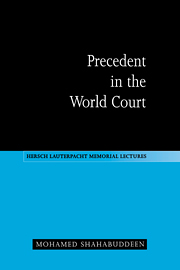Book contents
- Frontmatter
- Contents
- Foreword
- Preface
- List of abbreviations
- 1 Introduction
- 2 The growth of the Court's case law
- 3 Range of precedential resources
- 4 The bases of the system
- 5 The Advisory Committee of Jurists
- 6 The view taken by the League of Nations
- 7 The possibility of judge-made international law
- 8 Stare decisis
- 9 Distinguishing
- 10 Departing from a previous decision
- 11 Ratio decidendi and obiter dictum
- 12 Advisory opinions and decisions of chambers
- 13 The precedential impact of individual opinions
- 14 Effect and scope of the Court's case law
- 15 Conclusion
- Index
- Frontmatter
- Contents
- Foreword
- Preface
- List of abbreviations
- 1 Introduction
- 2 The growth of the Court's case law
- 3 Range of precedential resources
- 4 The bases of the system
- 5 The Advisory Committee of Jurists
- 6 The view taken by the League of Nations
- 7 The possibility of judge-made international law
- 8 Stare decisis
- 9 Distinguishing
- 10 Departing from a previous decision
- 11 Ratio decidendi and obiter dictum
- 12 Advisory opinions and decisions of chambers
- 13 The precedential impact of individual opinions
- 14 Effect and scope of the Court's case law
- 15 Conclusion
- Index
Summary
In important ways the World Court was established on the Continental model, which knows no doctrine of precedent. Indeed, if curiously so, in 1920 it was the representatives of the legal systems where judge-made law prevailed who were foremost in insisting that decisions of the Court should not have precedential force as understood in Anglo-American judicial practice. That in principle remains the case. And yet decisions of the Court are almost as replete with references to precedents as are decisions of a common law court. This monograph is devoted to some aspects of this phenomenon.
The subject, by reason of its nature, attracts reference to the common law experience. I accept that a more rounded approach could benefit from perceptions made from the standpoint of other legal traditions. Even so, imperfections will appear to me as soon as the text leaves my hands; others will surface in due course. I own the shortcomings in advance.
Judge Sir Robert Jennings, a former President of the Court, Judge Gilbert Guillaume and Professor Elihu Lauterpacht have been good enough to read the work in draft. I thank them for their comments.
The study, which is limited to decisions of the Court itself, is based on the Hersch Lauterpacht Memorial Lectures of November 1994. I thank Professor Lauterpacht for inviting me to speak. Sir Robert Jennings took the chair at the lectures and has now provided a foreword. I appreciate this.
- Type
- Chapter
- Information
- Precedent in the World Court , pp. xviiPublisher: Cambridge University PressPrint publication year: 1996



